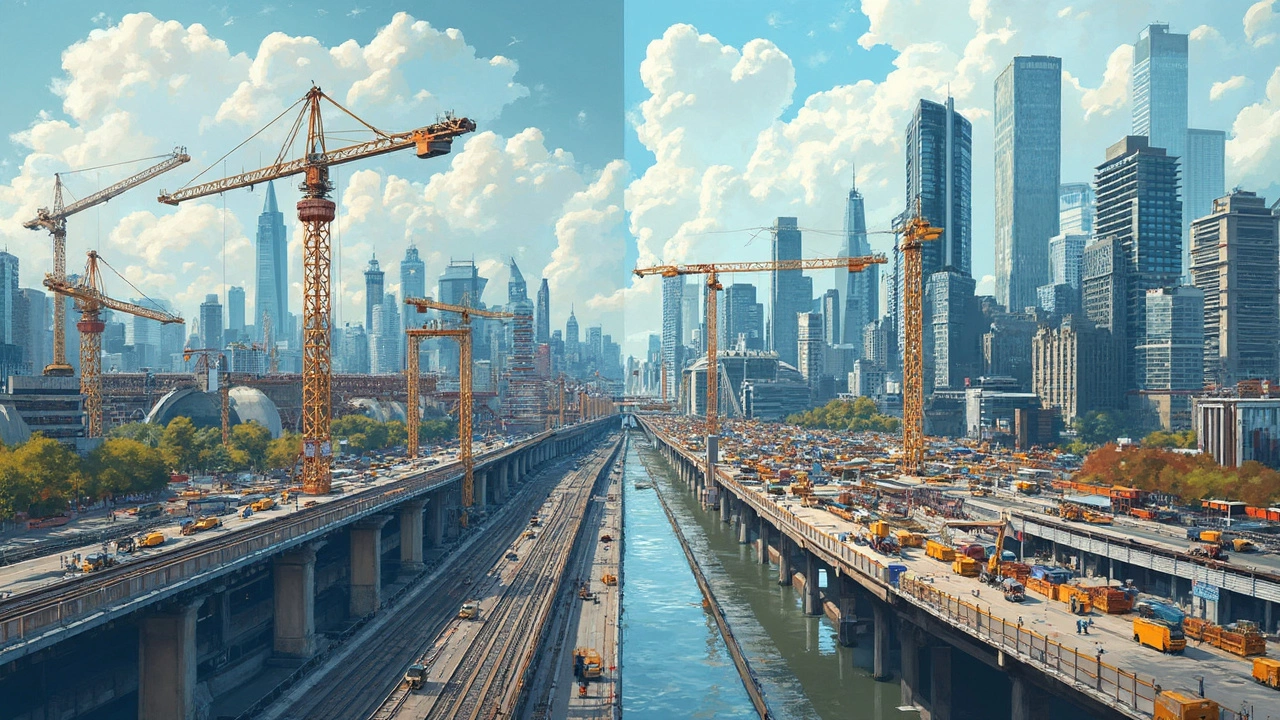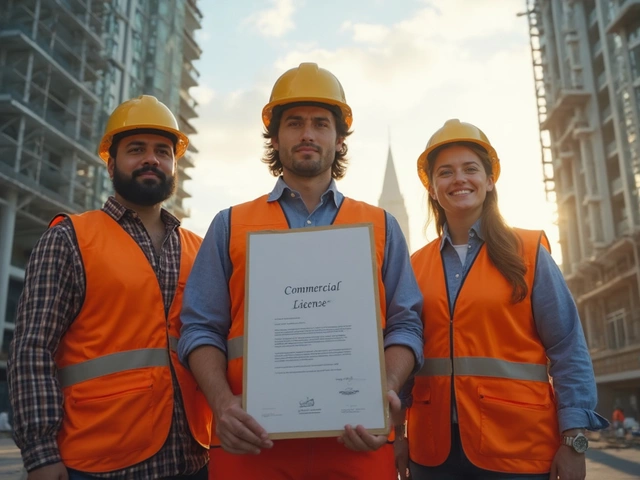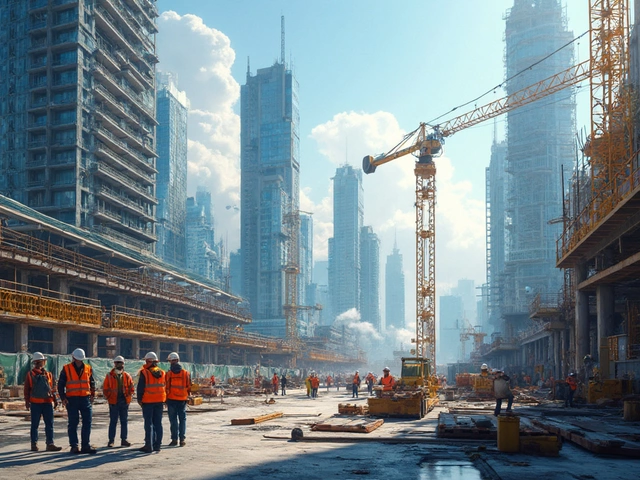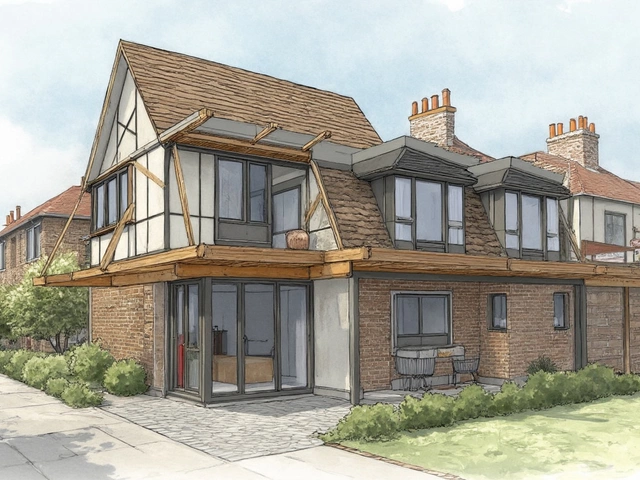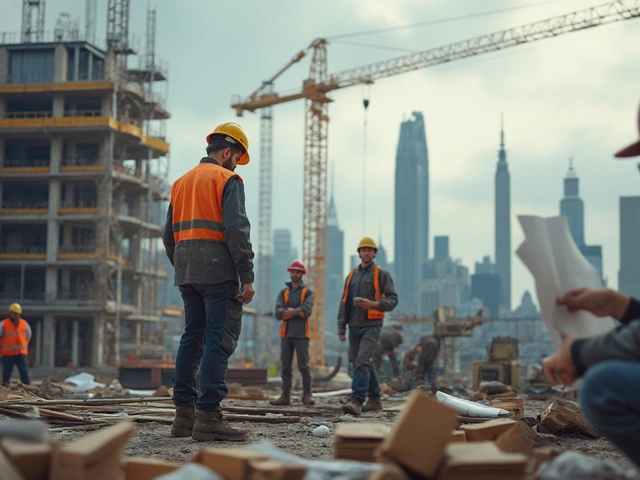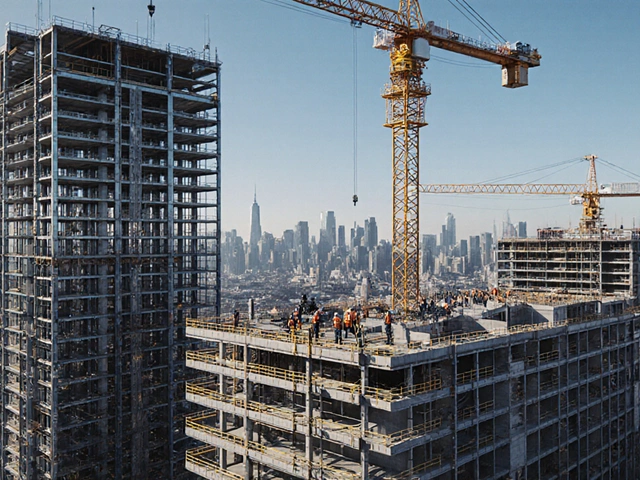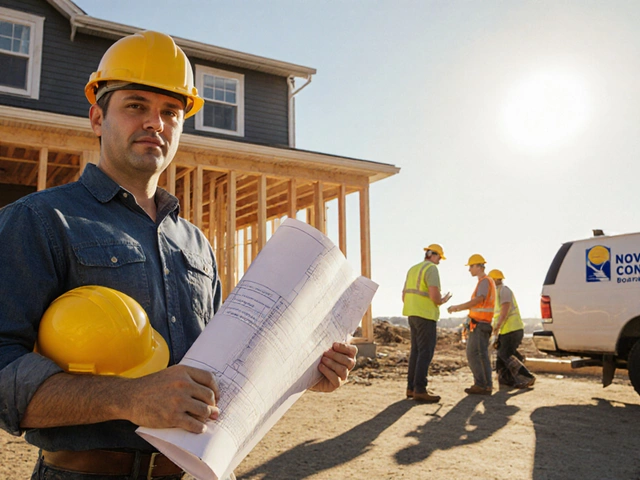Ever wondered why there's one group pouring concrete for highways and another group throwing up glassy office towers downtown? It's not just a matter of skills—it's a whole different world. Most people lump any kind of building work into one bucket, but construction pros split things into civil and commercial, and for good reason.
Civil construction is all about the stuff everyone uses but nobody really thinks about—roads, bridges, water treatment plants. If you've ever complained about traffic during roadwork, you've experienced civil construction first-hand. Commercial construction tackles things like restaurants, retail stores, hotels, or those brand-new gyms popping up in strip malls. The main goal? Create a place where people do business.
Knowing the line between these two actually helps you avoid headaches. If you mix them up—say, hire a crew that builds houses when you need a new office building—you could end up with delays, busted budgets, and some seriously grumpy inspectors. So, let's unpack what really separates these fields, with tips you can actually use if construction is on your radar.
- What Is Civil Construction?
- What Is Commercial Construction?
- How Projects Differ Day-to-Day
- Regulations, Budgets, and Timelines
- Why the Difference Matters to You
What Is Civil Construction?
When you hear "civil construction," think about the basic structures that make a city or town work. This type of construction focuses on things like highways, overpasses, water mains, drainage systems, and public parks. You could call it the skeleton of any place people live or gather. If you've crossed a bridge, flushed a toilet, or driven down a newly paved road, you've benefited from civil construction.
Here’s what usually falls under the civil side of things:
- Roads, highways, and freeways
- Bridges and tunnels
- Airports and railways
- Dams, reservoirs, and levees
- Water treatment and sewage plants
- Public parks and spaces
These are massive projects and usually owned or funded by the government. Some civil contractors work on private jobs, but the big ones—like that new interstate bypass or downtown sewer upgrade—usually come from city, state, or federal budgets. If Garfield could drive, he'd probably complain about detours caused by these jobs as much as I do.
Building a road is not the same as putting up a shopping mall. For one thing, civil jobs have to last. Highways might get twenty-ton trucks rolling over them every day, so builders use special materials and tougher designs. Here’s an idea of what's involved behind the scenes:
- Heavy-duty machines like bulldozers and cranes
- Surveying land and checking for things like underground cables
- More strict safety rules, since these projects usually impact the public
Here’s a cool stat: According to the U.S. Bureau of Labor Statistics, civil construction made up about $342 billion in spending in 2023. That’s a lot of concrete and asphalt. The scale also means these projects can take years and stretch across miles of land.
Bottom line—if the end result helps the public with transportation, water, or utilities, it fits into the civil category. It’s less about making a profit and more about keeping everyday life running smoothly for everyone.
What Is Commercial Construction?
Commercial construction isn’t just about putting up big buildings—it covers every job where the finished space is meant for business. Think shopping centers, hotels, restaurants, office complexes, banks, and warehouses. Even the gym down the street or your kid’s daycare probably sprang up from a commercial build.
The scope here is wide, but there’s a running theme: the project’s main purpose is commerce, not people living in it (that’s residential) or public infrastructure (that’s civil construction). What makes commercial projects special? They juggle speed, function, and lots of regulations—because the doors have to open for customers, and safety codes are no joke.
Here’s what you’ll see with most commercial builds:
- Multi-story steel or concrete frames for things like office towers
- Lots of specialized equipment: elevators, HVAC, fire suppression systems
- Strict deadlines, since delays mean lost business
- Constant coordination with city inspectors and code officials
Most commercial contractors work with architects, engineers, and even branding teams. The goal? Build something that draws customers in, works for employees, and stays in line with every rule in the book. Funny enough, commercial construction is one of the biggest sectors in the US building industry. In fact, new office and retail buildings made up about 35% of all non-residential construction spending in 2024, according to Dodge Data & Analytics.
You might also notice that these projects come in all sizes, from renovating a single restaurant to building an entire hospital campus. But no matter the size, there’s always high stakes. Slipping up on a fire code, accessibility law, or structural standard isn’t just a paperwork problem—it can cost millions and get your project shut down.
A quick look at typical commercial projects and their average costs (just for a reality check):
| Project Type | Average Cost (per sq. ft.) |
|---|---|
| Office Building | $150 - $350 |
| Retail Store | $100 - $200 |
| Restaurant | $250 - $400 |
| Warehouse | $80 - $160 |
That’s why picking the right contractor with proven experience is a huge deal. If you’re ever involved in a commercial construction project, ask to see past work—don’t just trust a handshake and a business card.
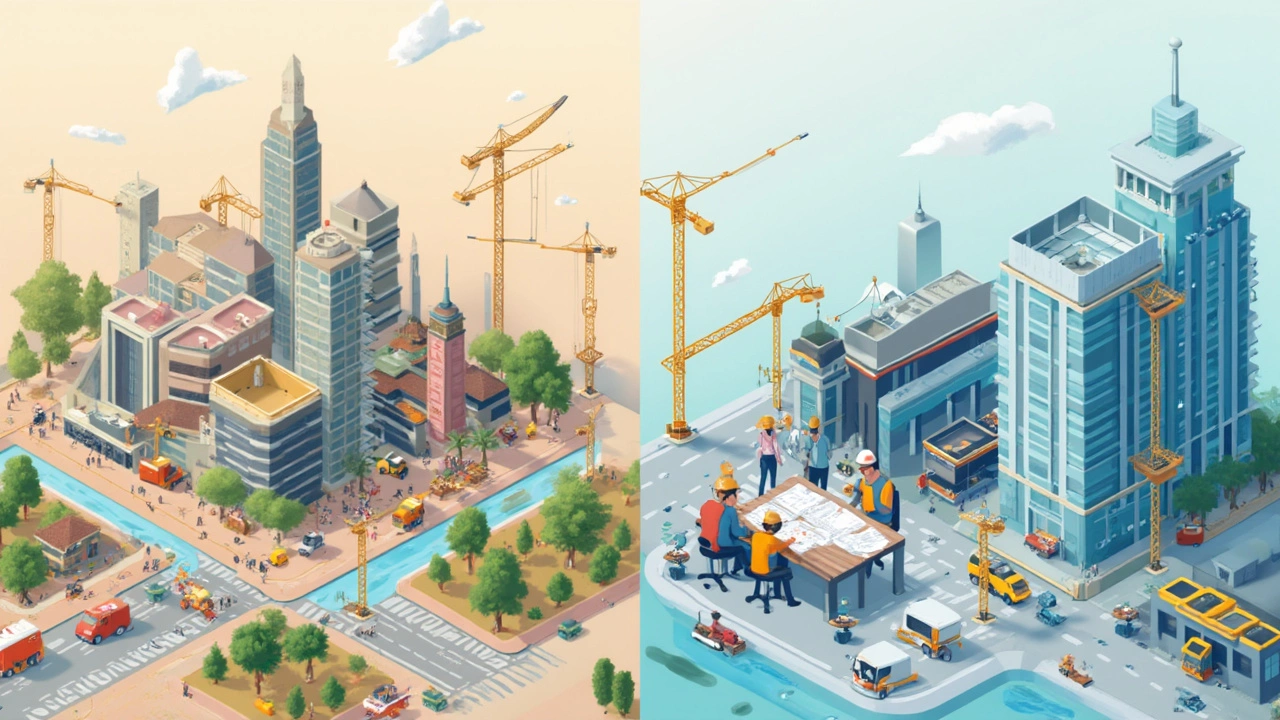
How Projects Differ Day-to-Day
When you look at a civil construction site next to a commercial construction project, the difference isn’t just the buildings—they work at a different pace, with separate priorities every single day. Civil construction jobs often run on huge sites with heavy earth-moving equipment, cranes, and long stretches of road or pipe to install. There’s a ton of coordination with government agencies, utility companies, and sometimes, traffic control teams. These teams might move slowly, but the jobs are huge—think re-routing a river under a new highway.
Commercial construction, by contrast, is all about balancing upgrades, tenant schedules, and keeping businesses happy. Crews usually work in tighter spaces, around existing power and water lines, often inside bustling cities. One day, they might be framing out offices, next day it's running HVAC ducts and installing commercial-grade elevators. These projects are all about finishing fast—retailers and business owners want to open and start earning money ASAP.
Here’s a sneak peek at the main day-to-day differences between civil construction and commercial construction:
- Project Team: Civil projects rely heavily on engineers and environmental consultants, while commercial teams include architects and interior designers.
- Permits & Inspections: Civil jobs navigate countless environmental and public safety inspections. Commercial sites focus more on building codes, fire exits, and accessibility (think elevators and ramps).
- Safety Risks: Civil construction comes with hazards like working around traffic and utilities. Commercial jobs are more about managing indoor safety, such as falls or electrical work.
- Material Deliveries: It’s not uncommon for a civil site to have huge trucks rolling in all day with concrete, steel girders, or piping, while commercial projects deal with frequent but smaller deliveries—tiles, windows, HVAC units—often right through busy city streets.
- Project Changes: Civil projects deal with nature—from surprise rainstorms to shifting soil. Commercial projects, though, often change because tenants tweak their layout or want cooler gadgets added last minute.
If you like numbers, check this out. According to a real 2023 industry report, the average duration for a civil infrastructure job (like a new overpass) was about 24 months. For a typical commercial building—like a three-story office—a crew wrapped up in around 12 months. Twice as long for civil work, and they’re rarely working with the same daily routine as commercial crews.
Regulations, Budgets, and Timelines
Here's where things really start to look different between civil construction and commercial construction. The rules, money, and time frames aren't just a little different—they’re often totally separate playbooks.
Civil construction jobs like highways or bridges are usually funded by local, state, or federal governments. This brings a mountain of paperwork. You’ll see government contracts, strict safety codes (often set by groups like the Department of Transportation or National Environmental Policy Act), and a parade of inspectors checking every nook and cranny. Miss a step, and the whole project can grind to a halt until it’s fixed.
On the commercial construction side, private businesses, developers, or organizations are usually paying the bills. Sure, there are building codes and zoning rules set by cities (think fire safety, accessibility, parking requirements), but the process is often faster because you’re not dealing with as much red tape as government projects. Still, you can’t ignore those inspections—one missed permit can delay that new restaurant by weeks.
Now, let’s talk numbers. Civil construction budgets can run into the hundreds of millions for big projects. Ever seen one of those “bridge closed until 2027” signs? That’s usually because of complex logistics and funding phases. Commercial jobs typically have tighter deadlines—store owners want those grand openings as soon as possible—so everyone hustles to stay on schedule.
| Criteria | Civil Construction | Commercial Construction |
|---|---|---|
| Typical Funding | Public (Government) | Private (Businesses/Organizations) |
| Inspection Frequency | Very High | High |
| Budget Size | Often $10M-$500M+ | $500K-$50M+ |
| Timeline Flexibility | Longer, phased | Shorter, fixed |
One tip for anyone getting involved: don’t underestimate the time and cost of permit approvals. In both civil construction and commercial construction, paperwork isn’t just busywork—projects stall the moment forms pile up.
So, whether you’re dealing with a bridge or a burger joint, knowing the rules of the game means fewer surprises, faster progress, and less stress all around.
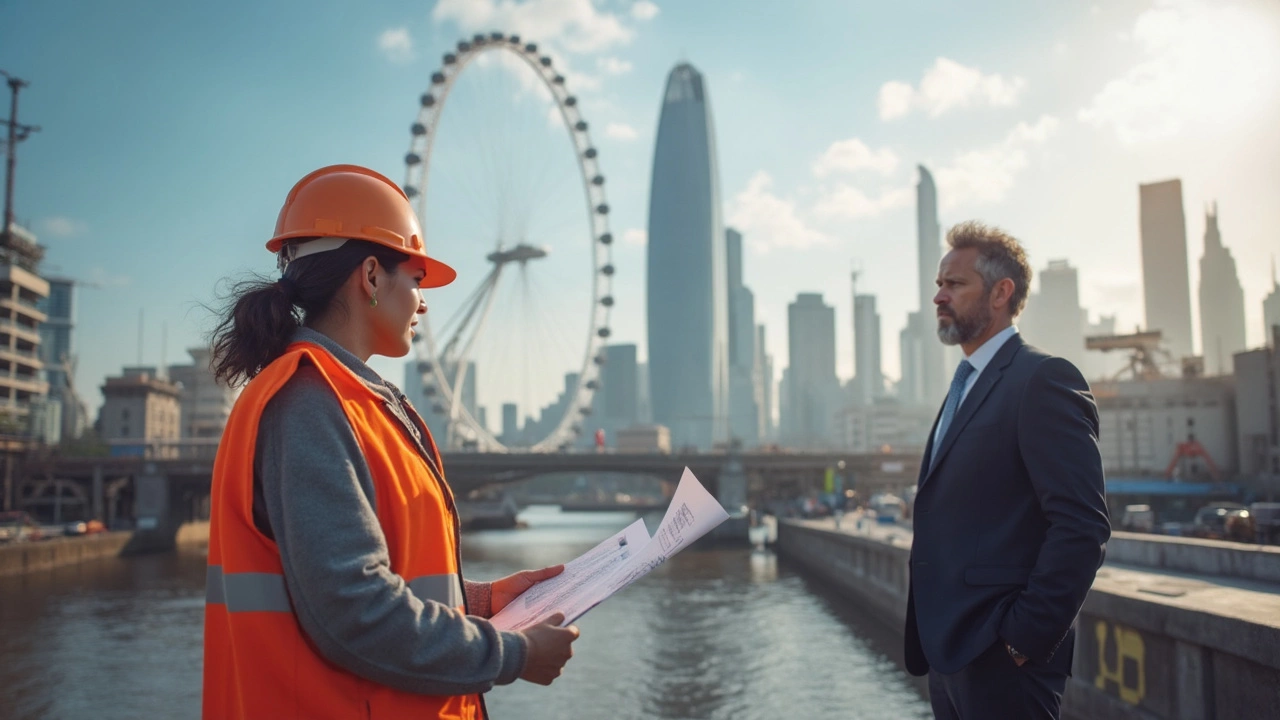
Why the Difference Matters to You
If you’re planning a project, knowing the real gap between civil construction and commercial construction can seriously save your wallet and your sanity. These differences affect everything from the permits you pull, the specialists you hire, and even how long you’ll be waiting to open for business or see your city upgrade a road.
First off, civil projects like highways or water pipes usually tap into public funds, while commercial construction projects depend mostly on private money or business loans. That means the paperwork, reporting, and rules you need to follow are wildly different. If you try to bid on a city bridge repair using a construction team that only handles cafes and gyms, forget it—the qualification lists and insurance demands won’t line up.
Timelines and budgets also play out differently. Civil jobs often take longer because they’re built in public spaces that have to stay open (think road closures: always a pain, right?). Commercial jobs happen on their own sites, so builders can sometimes move faster—unless local zoning gets in the way. Check this:
| Project Type | Typical Timeline | Regulations |
|---|---|---|
| Civil (bridge, road) | 12 months–5 years | Strict state, federal, public safety checks |
| Commercial (mall, hotel) | 8 months–2 years | City and business-specific codes |
On hiring: A civil engineer isn’t always the right fit for designing or managing a high-traffic store. Workers are trained differently. For example, a roadwork crew needs heavy equipment licenses and often works around traffic, while a team building offices focuses on fire exits, elevators, and business code stuff. Asking detailed questions (“Have you handled city-funded jobs or retail build-outs?”) can make all the difference when picking a builder.
If you ignore these distinctions, you could be stuck with a crew that doesn’t have the right insurance or certifications, making permits and city inspections a nightmare. And any mess-up here isn’t just paperwork—mistakes can mean expensive delays or even lawsuits.
Bottom line: If your project hits the wrong side of the civil vs. commercial line, you risk blowing your budget, missing deadlines, and maybe even endangering public safety. Know the boundaries, ask the right questions, and stick with the right type of contractor for the job.
